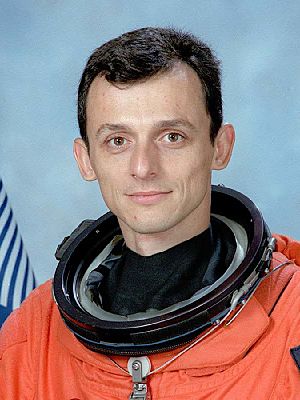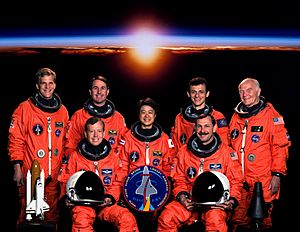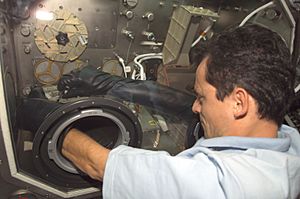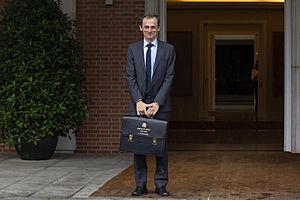Pedro Duque facts for kids
Quick facts for kids
The Most Excellent
Pedro Duque
OF OMSE
|
|
|---|---|

Duque in January 2000
|
|
| Minister of Science, Innovation and Universities | |
| In office 7 June 2018 – 12 July 2021 |
|
| Prime Minister | Pedro Sánchez |
| Preceded by | Position established |
| Succeeded by | Diana Morant |
| Member of the Congress of Deputies | |
| In office 21 May 2019 – 21 February 2020 |
|
| Constituency | Alicante |
| Personal details | |
| Born | 14 March 1963 Madrid, Spain |
| Political party | Independent |
| Occupation | Flight engineer |
| Awards | Grand Cross of Aeronautical Merit Prince of Asturias Award for International Cooperation Medal "For Merit in Space Exploration" |
| Status | Retired |
| Space career | |
| ESA astronaut | |
|
Time in space
|
18d 18h 46min |
| Selection | 1992 ESA Group |
| Missions | STS-95, Soyuz TMA-3/2 |
|
Mission insignia
|
|
Pedro Francisco Duque Duque, born in Madrid, Spain, on March 14, 1963, is a famous Spanish astronaut and aeronautics engineer. He also worked as a politician, serving as the Minister of Science for Spain from 2018 to 2021.
From May 2019 to February 2020, he was a member of the Congress of Deputies for Alicante. Since December 2023, he has been the chairman of Hispasat, a Spanish satellite company.
Contents
Pedro Duque's Early Life and Education
Pedro Duque was born in Madrid in 1963. His father worked as an air traffic controller. His mother was a school teacher. Both of his parents were from Badajoz.
In 1986, Pedro Duque finished his degree. He studied Aeronautical Engineering at the Universidad Politécnica de Madrid. After graduating, he worked for a company called GMV. He also worked for the European Space Agency (ESA) for six years. In 1992, he was chosen to become an astronaut.
Pedro Duque's Astronaut Career
Pedro Duque trained to be an astronaut in both Russia and the United States. His first trip to space was on the Space Shuttle mission STS-95. During this mission, he helped manage special experimental equipment for the ESA.
In October 2003, Pedro Duque visited the International Space Station. He traveled there on a Soyuz TMA ship. He stayed for several days during a crew change. The ESA and Spain named his science program for this visit "Misión Cervantes."


University and Business Work
After his space missions, Pedro Duque started working at the UPM School of Aeronautical Engineers in 2003. He was in charge of operations for the Spanish USOC. He also taught students about space science and how space missions work.
In 2006, Pedro Duque became the Managing Director (CEO) of Deimos Imaging. This was a private company. In 2009, the company launched the first Spanish satellite for observing Earth. This satellite, called Deimos 1, helps with farming, finding wildfires, and controlling them. In 2011, he became the Executive President of the company.
Return to the European Space Agency
In October 2011, Pedro Duque went back to his job at the European Space Agency. He returned to his role as an astronaut. Until 2015, he led the Flight Operations Office. This meant he was responsible for ESA's work on the International Space Station.
In 2016, Pedro Duque took part in ESA CAVES training. After that, he became responsible for reviewing future crewed flights for the ESA. This was part of the ESA's astronaut team.
Pedro Duque as a Minister

In June 2018, there was a big change in the Spanish government. Pedro Sánchez became the new leader. He chose Pedro Duque to be the Minister of Science, Innovation, and Universities.
In April 2019, Minister Duque announced good news. His ministry would give more money to the European Space Agency. They planned to add €701 million between 2020 and 2026. This was to make sure Spain contributed fairly based on its economy.
Pedro Duque also ran in the April 2019 and November 2019 general elections. He was elected as a Member of Parliament for Alicante. In January 2020, Pedro Sánchez confirmed Duque would continue as Minister of Science and Innovation. However, the responsibility for universities went to a new minister, Manuel Castells. Pedro Duque resigned from being a Member of Parliament on February 21, 2020.
In May 2022, he joined the special committee of Destinus. This company is working on a very fast aircraft. It uses liquid hydrogen and can fly at hypersonic speeds. In December 2023, he became the chairman of Hispasat.
Awards and Recognitions
Pedro Duque has received many awards for his work:
- Order Of Friendship of the Russian Federation (1995)
- Grand Cross of Aeronautical Merit (1999)
- Prince of Asturias Award of International Cooperation (1999)
- Doctor Honoris Causa from the Technical University of Valencia (2005)
- Medal "For Merit in Space Exploration" of the Russian Federation (2011)
- Doctor Honoris Causa from the European University of Madrid (2013)
- Doctor Honoris Causa from the National University of Distance Education (2016)
- Doctor Honoris Causa from the University of Almería
See also
 In Spanish: Pedro Duque para niños
In Spanish: Pedro Duque para niños
- Lists of astronauts
- List of Hispanic astronauts
 | Victor J. Glover |
 | Yvonne Cagle |
 | Jeanette Epps |
 | Bernard A. Harris Jr. |

